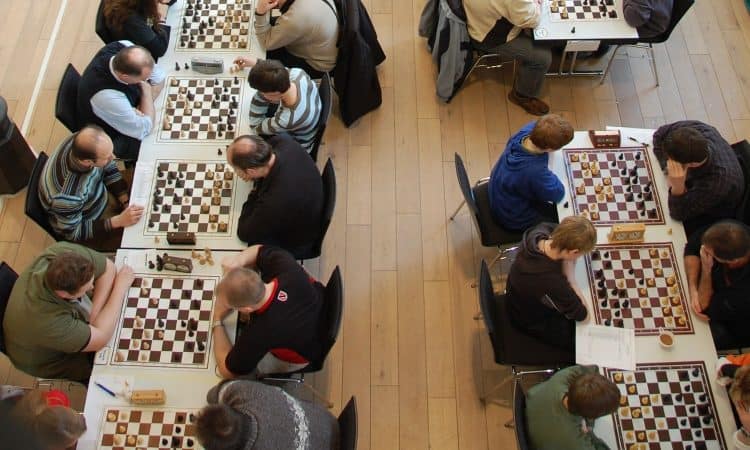If you are on Chess.com, you may have been wondering what rating your account should be before playing online tournaments. This article will discuss what the different ratings on Chess.com are and how they affect your chess capability in online tournaments.
Generally speaking, you do not need any sort of rating to enter most tournaments, as long as you are confident in your ability both as a chess player and as someone capable of recording their own moves for the record. You should be able to think quickly, and have confidence in your playing style. In this article, we’ll go more in depth on the Chess.com rating system, and how it can affect tournament eligibility.
What Is The Chess.com Rating System
The organization that gives you an official ELO rating is FIDE. Essentially, every player on Chess.com has a rating that they start out with. The purpose of this rating is to signify the level of skill that each player has. The algorithm of the website uses this to better match you against other types of players that have similar ratings, so that the matches are more fair.
There are a few different factors that goes into one’s score on Chess.com, as winning or losing games don’t necessarily contribute to a raise or decline in one’s overall rating. This factors can include:
- The difference between your opponent’s rating and your rating
- Chess.com’s confidence in your rating as it currently stands
- Chess.com’s confidence in your opponent’s rating as it currently stands
The weighting of the difference between you and your opponent’s ratings are fairly straight forward. If you lose to someone with a lower rating, it will impact your score more than if you had lost to someone with a higher rating, and the same goes for winning against someone with a higher rating vs losing against someone with a higher rating.
The system that Chess.com uses is referred to as the Glicko rating system, which uses a ‘rating deviation’ to factor into what determines your rating. Essentially, the lower the RD, the more confident Chess.com is of the validity of your rating. You can view this number on your stats page for each individual game that you finish, and on your account page.
How Do Chess.com Tournaments Work
On Chess.com, there are new tournaments hosted that take place all times of the day. You can check their schedule to get up to date alerts of when the next tournaments will be each day. If you’d like to register for one, the registration period begins one hour before any tournament officially begins. As mentioned above, there are zero requirements in terms of your rating level in order to join a tournament, all levels are allowed to play against each other.
Chess.com has 6 different time-controlled types of tournaments, and two tournament formats – Arenas and Swiss Tournaments.
When playing a tournament, registered players will all get an alert notification in the chat area, signaling that it’s time to get ready to compete. Once the tournament comes to an end, all winners will be announced, and the entire final scores and results can be found on the “Standings” tab on the website. Generally, trophies are awarded to those who placed 1st, 2nd, or 3rd, and player rating bears no influence on these trophies. While all tournaments are open-rating, generally the servers will try to match you with someone of a comparable skill level.
So even if you’re a beginner, you should be able to enter a tournament without any issues.
What Is A Tournament Clock
A tournament clock is simply a Chess clock. It is a way to regulate the pace of each game in a tournament setting so that all players have equal time limitations during each game. Each player has two minutes per move while playing in tournaments, which is standard for most competitive chess games. If you choose to play out your game online, you will have a tournament clock set for each game during the tournament.
Once a player has completed their time, it will be announced in the chat area of the website. Once this happens, all players will have a certain amount of time until they must make their next move on the chess clock. If you do not wish to play another move during that particular time period then simply click “Pass,” and your game will continue to proceed with other players’ clocks still active as well.
What Is A Good Chess.com Rating To Start At
When you first make an account, they start you at 1200, which is a little high. If you’re new, you’re going to lose quite a few games. I dropped down to about 650 from 1200. Then I started learning and slowly climbed up.
Play for a few months, learn the fundamentals and some solid openings like the Advanced French Defense before entering tournaments.
Here are the following ratings and their corresponding titles:
- Grandmaster – 2600 and up
- Senior Master – 2400-2599
- Master – 2200-2399
- Expert – 2000-2199
- Class A – 1800-1999
- Class B – 1600-1799
- Class C – Under 1600
Many chess players begin between classes C and A, but more experienced chess experts should easily be able to rise through the ranks toward Grandmaster fairly quickly, based on the Glicko rating system.
How Can I Improve My Rating?
If you’re looking to improve your overall chess rating, it’s great to play against stronger chess players on a regular basis so that you can get used to higher level competition through playing online.
For tournaments, you should try to play as much as possible in order to gain more experience. Remember that it is not the final results of a tournament that affects your rating score, but rather how well you do against your opponent’s rating. So even if you lose a tournament, if you played an excellent game with your opponent and he/she had a slightly higher rating than you, it can still improve your overall score.
Chess.com also has pretty substantial resources on their website to help you improve and hone your skills. They have an entire “Learn” section with lessons, articles, analysis, videos, and much more that’s free to use to help get your game up and do better in those tournaments.
Lastly, practice makes perfect when it comes to improving your skills with chess. Taking time to go over your games from past tournaments and playing against your friends is a great way to improve as well.
Conclusion
There’s a lot to learn on how to improve your chess rating, but if you focus on what you can do at Chess.com, your rating will improve naturally over time. For more information, see our guides on how to get better at Chess and how to stop blundering in Chess.
Sources


